
Lucha pushes for reform all the way up to the presidency, but it most actively engages at the community level. Its local activities generally take the form of popular education or protests…BY RUBY BANTARIZA, TIM HIRSCHEL-BURNS & SOPHIA SCHUSTER
Kinshasa, DRC | AFRICAN ARGUMENTS | Five years ago in the eastern Congo, a group of friends from the University of Goma were rushing home in the heavy rain when their journey was interrupted. They saw that the streets ahead were flooded and they couldn’t pass.
Furious that the government could not provide even the most basic drainage systems, they decided there and then to take matters into their own hands. As they sheltered from the downpour, they founded a new kind of grassroots movement that would push for reforms. They called it Lutte pour le Changement (“Struggle for Change”).
No one seems completely sure whether this origin story is true or not. But since its founding, that organisation – now better known by its abbreviation “Lucha” – has become one of the greatest threats to the country’s political status quo today.
Neither an NGO nor a political party, the movement positions itself outside traditional civil society. It organises non-violently at both the local and national level. And it has taken part in organising widespread protests, sometimes leading to high-profile arrests of its members.
It turned five years old in May.
READ FULL ANALYSIS HERE (click)
How did the youth group @LuchaRDC become one of the greatest threats to the DR #Congo‘s political status quo? https://t.co/WAwJDJb2es
— African Arguments (@africaarguments) June 3, 2017
 The Independent Uganda: You get the Truth we Pay the Price
The Independent Uganda: You get the Truth we Pay the Price



